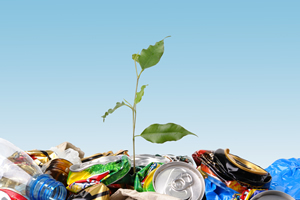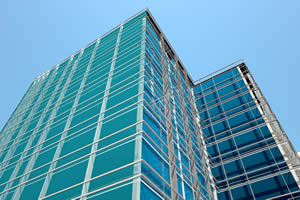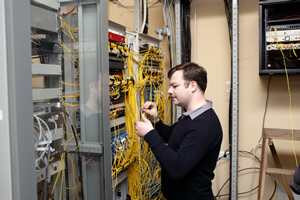Ziraat Bank and The Environment
Ziraat Bank is an exemplary corporate citizen by spearheading environment-related initiatives and authoring best practices for dealing with such issues.
For the last two decades, the relationship between the environment and economic development has been one of the world’s most hotly-debated subjects. Even as the United Nations and a host of international initiatives engage in efforts to protect the environment and to combat climate change and such issues are debated at multilateral conferences, progress is slowed by claims that protecting the environment means sacrificing economic growth and development.
An essential duty incumbent on world-leading companies like Ziraat Bank is to behave like an exemplary corporate citizen by spearheading environment-related initiatives and authoring best practices for dealing with such issues. Such a role makes it necessary not only to control and minimize its own direct environmental impact but also the indirect environmental impact caused by its products and services and throughout our the value-creation chain. At the same time, Ziraat Bank regards protecting the environment and combating climate change as avenues leading to the creation of new business opportunities and to the possibility of generating added value on a variety of fronts ranging from employment to reducing the national current account deficit.
Since the early 2000s, Ziraat Bank has been involved in projects seeking to optimize its use of resources such as energy, water, natural gas, and paper in its business processes, to conserve them, and to eliminate waste. Under the Sustainability Policy that it announced in 2014, the Bank has embarked upon a process of creating a new and systematic structure for its efforts to manage direct environmental impact.
Since the early 2000s, Ziraat Bank has been involved in projects seeking to optimize its use of resources such as energy, water, natural gas, and paper in its business processes, to conserve them, and to eliminate waste.

Ziraat Bank’s environmental objectives
In 2013, the total carbon footprint of the Ziraat Bank Headquarters was 7,298 tons, of which 2,566 tons and 4,732 tons were from direct and indirect emissions, respectively.
ZİRAAT BANK’S 2013 ENERGY CONSUMPTION AND CARBON FOOTPRINT
Total direct energy consumption and emissions (Scope 1) for Ziraat Bank Head Office locations
Head Offices |
Direct Energy Consumption - GJ |
Direct Emissions |
|---|---|---|
Natural Gas |
27,300 |
1,470 |
Diesel |
13,061 |
1,015 |
Gasoline |
1,118 |
81 |
TOTAL |
41,479 |
2,566 |
Total indirect energy consumption and emissions (Scope 2) for Ziraat Bank Head Office locations
| Head Offices | Indirect Energy Consumption - GJ |
Indirect Emissions |
|---|---|---|
Purchased Electricity |
36,091 |
4,732 |
Ziraat Bank has also started collecting its energy and emissions data from its regional offices and branches across Turkey. For FY13 the Bank managed to calculate its diesel and gasoline consumption of 112,971 GJ and associated Scope 1 emissions of 8,731 tCO₂e from its regional offices and branches. The Bank also managed to calculate its purchased electricity consumption of 60,026,389 kWh and associated indirect (Scope 2) emissions of 28,332 tCO₂e from its regional offices and branches for FY13.
ZİRAAT BANK’S 2013 WATER CONSUMPTION
Total water withdrawal (m³) for Ziraat Bank Head Office Locations
Location |
m³ |
|---|---|
Head Office Buildings - Ankara |
82,283 |
Head Office Buildings - Istanbul |
9,468 |
HEAD OFFICE BUILDINGS TOTAL |
91,751 |
Efforts to improve natural resource consumption
Paper use and optimization projects
Paper ranks high among the most frequently-used supplies at Ziraat Bank owing to its role as a financial services provider.
Ziraat Bank’s paper procurements amounted to 2,084 tons in 2013. In order to reduce its paper consumption, Ziraat Bank adheres to an approach that focuses on taking advantage of electronic media wherever possible when processing, transmitting, viewing, and retaining (archiving) documents. Thanks to such efforts and practices, an average of 25 million sheets of A4 paper are being conserved every year.
Brief information about projects to decrease paper use at Ziraat Bank and to enhance the effectiveness of paper that is used is presented below.
Under the Sustainability Policy that it announced in 2014, the Bank has embarked upon a process of creating a new and systematic structure for its efforts to manage direct environmental impact.
Electronic-format appraisal reports
Since November 2011, all appraisal reports generated at Ziraat Bank have been requested, disseminated, and archived electronically.
Thanks to this new system, bank employees’ non-banking operational workloads and risks have been reduced and operational standards have been improved. Once issued by the system, electronic-format appraisal reports can also be stored and displayed from within the system without having to undergo any other archiving process. This system also prevents the generation of unnecessary printouts.
E-mailed customer transaction advice notes and statements
In 2013, Ziraat Bank began sending statements of all transactions performed by its Operations Center to customers by email.
Under the Centralized Bulk Statement Dispatch Project, transaction notes and statements for transactions which must be so reported as well as for those which requests are made are sent to customers by email.
Bulk bill payments
Work has begun on a project to send out electronic-format rather than paper invoices documenting communication services. Since June 2013, all telephony-related invoices are being processed through the electronic system. Considering that more than 163,000 telephone bills were handled last year alone, the savings in paper resulting from this procedure may be appreciated.
Loan account documentation
Work is in progress on a project to create virtual loan-account files to replace the physical ones that are used for loan applications. All application-related documents will be scanned into the system after which it will be possible for all involved/authorized units to display them. This project will contribute significantly towards paper-reduction efforts.
In the case of documents that the law requires be obtained from other agencies and organizations when making credit allocation decisions, efforts are currently being made to obtain these from their sources in electronic format as well. That will help such outside concerns in their own efforts to reduce paper use; for the Bank, it will increase employee motivation and customer satisfaction by speeding up processing.
In January 2013, the Bank began obtaining electronic-format documents and information required of firms taking out loans to finance investments. This also saves paper, labor, time, and space. Documentation used in performing firms’ financial analyses is also being circulated among units in electronic format.
The practice of sending out documents concerning loan applications approved by Ziraat Bank by mail or fax has been terminated. These documents are now being transmitted in electronic format along with the original application appended to them. A centralized collection system encompassing all Ziraat Bank branches became operational on 12 March 2013.
Electronic-format inspection and internal control reporting
Under a new auditing and control model that is about to be put into effect, all inspection and internal control reports will be issued in electronic format and physical documents will no longer be circulated. This project is expected to contribute significantly to paper conservation.
E-signature & Virtual Inspection Archives Project
With the E-signature & Virtual Inspection Archives Project, the Bank will take another step in the direction of a paperless office environment by replacing all “wet” signatures with electronic ones. Under this project, electronic-format inspection reports and all Board of Inspectors documentation will be stored digitally in the Virtual Inspection Archives. Eventually, digitized reports with e-signatures will also be sent in external correspondence with official agencies.



Other paper conservation activities
Ziraat Bank seeks to optimize the use of environmentally-harmful office supplies and materials.
When procuring office equipment such as printers and fax machines that require expendable supplies such as toner and drums, the Bank gives attention to the total cost of ownership, which is defined as acquisition cost plus the cost of a unit’s operating supplies over a five-year period. In this way, the Bank takes the potential environmental impact of supplies into account and purchasing decisions are made on that basis rather than on low initial cost. Preference is also given to equipment that requires less in the way of expendables over the course of its useful lifetime. By doing so, the Bank helps reduce the adverse environmental impact arising both from the supplies’ production and from their disposal as waste.
In the tendering for multifunction printers to be procured in 2013, one of the criteria was “use less toner”. In keeping with this, toner-saving software was procured to reduce toner consumption and costs. This program makes it possible to adjust the amounts of toner used by a machine according to different needs. According to the various scenarios in the feasibility study prepared for the program, the software reduces Ziraat Bank’s toner expenditures by between USD 100,000-200,000 a year.
In addition, a pixel optimization solution was purchased that achieves about a 25% saving in the amount of toner used in all printouts taken at the Bank. By lowering toner emissions, the amounts of potentially carcinogenic materials released into the environment is also reduced. Centralized toner management also reduces stock costs by automatically dispatching toner supplies to branches and units only when the currently available stock level has fallen to 20%.
Ziraat Bank intends to enter into agreements with environment ministry-licensed firms authorized to safely collect and dispose of spent toner cartridges. This procedure is expected to begin in 2014.
Waste management
Waste paper
Since 2003, Ziraat Bank has been collecting its waste paper as well as paper documents whose retention by the Bank’s units is no longer mandated by law and selling it to licensed firms for use in recycling. In this way, the Bank helps reduce the amounts of new raw materials needed in paper manufacturing while also contributing beneficially to the consumption of production factors. A total of 139 tons of waste paper generated by headquarters units was sold in this way during 2013.
IT and other scrap
Ziraat Bank sells discarded IT equipment (computers, printers, photocopiers, etc.), consisting largely of sheet metal (housings, storage batteries, and ATM units) to environment ministry-licensed firms authorized to transport and process such scrap. This prevents the scrap from causing environmental harm while also ensuring that it is recycled for use as inputs by others.
Fire extinguishers
When replacing the chemicals in fire extinguishers that have passed their expiration date, Ziraat Bank works with firms licensed to collect and dispose of such materials. By working only with duly supervised and authorized firms, the Bank ensures that the chemicals are properly eliminated without causing environmental damage.
Monitoring and reducing the environmental impact of construction projects
In the conduct of its own construction works, Ziraat Bank takes an R&D approach when considering the functionality of their plumbing, electrical components, fittings, furniture, furnishings and similar inputs and such aspects as regional and local suitability and recyclability. The Bank gives precedence to concepts whose environmental impact is potentially the least.
Making sustainability concepts intrinsic to architectural and engineering projects and identifying the results of such efforts takes time and correctly quantifying all their ramifications is possible only through long-term objective research.
During 2013, construction work was completed on 360 branch projects in which due attention was given to sustainability concepts. In the project design and application stages, precedence was given to the use of innovative, composite materials that transcended classical criteria and whose environmental impact was considered as well.
When structures are to be demolished, attention is given as early as the project-costing stage to the recovery and reuse of materials. Particular care is given to recycling natural materials. During 2013, about twenty of the Bank’s service buildings underwent controlled demolition and their materials were recovered.
In order to minimize the environmental impact of Ziraat Bank construction projects, waste generated during the conduct of work is transferred under supervision to locations designated by local municipal authorities. In all such projects, efforts are made to contribute beneficially to the environment through effective supervision that ensures that waste is properly removed from building sites.
Ziraat Bank intends to obtain LEED (Leadership in Energy and Environmental Design) certification for the Ziraat Towers project that it is having built at the International Financial Center Complex in İstanbul’s Ataşehir district.


Enhancing value to the environment: Ziraat Bank’s new LEED-certified headquarters project
Ziraat Bank intends to obtain LEED (Leadership in Energy and Environmental Design) certification for the Ziraat Towers project that it is having built at the International Financial Center Complex in İstanbul’s Ataşehir district. LEED is a “green building” ratings program and such certification is given only to accepted world-class best practices in building design, construction, operation, and maintenance. Among the features of the new Ziraat Bank headquarters that will qualify it for LEED certification, mention may be made of the following:
Initiatives to reduce energy use
Ziraat Bank is focused on having a sustainable IT infrastructure that uses energy efficiently.
When tendering its computer, multifunction printer, and similar IT procurements, Ziraat Bank makes energy use one of the criteria of its total cost of their ownership calculations. The Bank seeks to reduce the operating costs of such equipment over the course of its useful lifetime by procuring units that use less energy. Besides reducing the load that these units impose on the national energy grid, this approach incidentally leads to water resource conservation because 22% of the country’s electricity is generated by hydroelectric power plants.
In all IT hardware procurements, energy consumption is treated as an important parameter that informs the contract award decision. Total cost of ownership is calculated taking into account the amount of energy that a unit will use over a five-year period. This rule supports the procurement of energy-efficient IT hardware.
When hardware is to be procured, Ziraat Teknoloji, a bank-owned technology subsidiary, takes part in the preparation of technical specifications and also subjects equipment to performance tests that include electrical-efficiency measurement. Electrical efficiency is one of the specific criteria to which points are assigned during the testing process and preference is given to goods that earn suitable utilization ratings.
Instead of purchasing separate printers, photocopiers, scanners, and fax machines, preference is given to equipment that saves energy by combining all four functions in a single unit. This practice results in energy savings of up to two-thirds.
E-signatures in tenders
Ziraat Bank has begun using e-signatures in its tendering processes in order to save on time as well as on the fuel and paper that would otherwise be used by/for personnel and travel. This helps eliminate the environmental harm caused by the use of expendables in the conduct of procedures and it also permits labor and time to be used for other purposes.
Less travel through videoconferencing
Ziraat Bank possesses a huge service network that reaches every part of Turkey. Videoconferencing is used for meetings in which the Bank’s headquarters units and other units scattered all over the country must take part. This method helps reduce the incidental environmental impact caused by the Bank’s travel and transport activities.
Synergies between branches in different localities
Information and operations related to customers’ projects in different cities are handled with the support (including technical personnel) of the regional/branch units involved. This saves on fuel, time, and labor costs.
Centralized audit
Potentially risk-fraught transactions are identified by means of a variety of scenarios deployed every month by the Ziraat Bank centralized audit team. This allows necessary checks to be made through the system without any physical documentation being required. This practice saves not only paper but also time, expense, and energy.
Fuel-consumption criteria in vehicle procurements
When procuring vehicles, Ziraat Bank gives as much attention to fuel consumption as it does to other criteria. The fuel that vehicles being considered for purchase require is treated as an element of total cost of ownership while fuel economy is included as one of the criteria of tendering specifications. Besides lowering the vehicles’ environmental impact, this practice also incidentally reduces total fossil fuel consumption at the national level.
Changeover to LED illumination
Seeking to conserve energy wherever possible, Ziraat Bank is reducing its illumination costs by installing more energy-efficient LED lighting systems in its branches, signage, and ATM housings. The Bank is also minimizing its use of fluorescent lighting owing to the human and environmental health and safety issues that it poses.
Efficiency in architectural design
When designing architectural projects, resource utilization is improved through the use of natural daylight, potentially eco-harmful materials are avoided, and precedence is given to applications that will quickly pay for themselves in two years or so.
Changeover to a new WAN structure
A project, launched about a year ago to change all branch data lines to a new WAN (wide area network) structure, is slated for completion by the end of March 2014. Under this project, transfer speeds will be increased and cabling will also be simplified without the need for new hardware.
Ziraat Bank owns and operates an extensive ATM system. Studies looking into the feasibility of installing biometric systems on ATM units and their housings are currently in progress. With the completion of this project, it will also be possible to centrally monitor local ambient temperatures and energy use. By collecting and analyzing such data, energy use can be reduced by making fine-tuned adjustments.
Centralized branch inspections
Along with the introduction of the New Auditing Model at Ziraat Bank, the Centralized Inspection Project will also become operational, thereby making it possible to perform branch inspections directly from headquarters. Under this project, bank inspectors will carry out their inspections remotely without having to actually visit a branch’s physical premises. This project is expected to achieve significant savings in terms of time, cost, and energy.
Identifying risky transactions by the Inspection Scenario Team
Scenarios have been composed for use by the Inspection Scenario Team to identify transactions that are incompatible with Ziraat Bank’s corporate risk attitudes. These scenarios will enable the team’s members to spot potential risks among thousands of transactions and enable bank inspectors to focus their attentions on those. This project is intended to achieve significant savings in terms of time, cost, and energy.
Enhancing value to the environment: Ziraat Bank Data Centers Project
Ziraat Bank is restructuring its data centers in light of its current needs. The Ziraat Bank Data Centers Project has a twofold IT focus that concentrates separately on:
In the design, construction, installation, and relocation of data centers, attention is to be given to the interactions among all of these services.
The gains to be secured through this project may be summed up as follows:
In the area of renewable energy and energy efficiency investments, which have become increasingly more important in Turkey and throughout the world especially in recent years, projects are being carried out that will increase both the bank’s knowledge about such matters and its capacity.

In 2013 Ziraat Bank procured 1,724 split air conditioners equipped with high energy-efficiency inverter technology and non-ozone-depleting gas.
As things currently stand, Ziraat Bank consumes 6,570,000 kWh of electricity every year. With the renovation of the Ziraat Bank Data Centers, it is anticipated that this will fall to about the 4,226,700 kWh level, corresponding in other words to savings of about 2,343,300 kWh a year.
IT power utilization
In 2005 Ziraat Bank initiated a Green IT project with the aim of optimizing the energy use of the computers used in its branch, regional, and headquarters units.
Under a policy introduced in 2013, users are messaged notices advising them to shut down their computers. These warnings are sent out at 19:30, 21:30, and 23:30. Units will automatically shut down unless the user takes action within 60 seconds of the notification. When computers at Ziraat Bank remain idle for 10 minutes, their monitors automatically go into sleep mode in order to help conserve energy.
Other environmental-impact mitigation activities
In 2013 Ziraat Bank procured 1,724 split air conditioners equipped with high energy-efficiency inverter technology and non-ozone-depleting gas. Of these units, 212 that the Bank procured to help reduce its heating costs, comply with the Variable Refrigerant Flow/Volume (VRF/VRV) standard.
The specifications for Ziraat Bank’s procurements of cleaning materials used by its branches and units stipulate that they must be manufactured from chemicals that are not harmful to either human or environmental health. The cleaning equipment (vacuum cleaners, mops, floor polishers, etc.) and the cleaning supplies (detergents, soaps, polishes, disinfectants, etc.) used to clean service buildings are procured by outside cleaning service providers however their compliance with specifications are periodically checked by the Bank.
In line with its efforts to reduce the environmental impact of its personnel transportation services, Ziraat Bank has begun using routing software that shortens travel distances and thus saves fuel. This project, which seeks both to maximize service quality and to minimize cost, is slated for completion by the end of 2014.
Ziraat Bank focuses on efficiently managing its indirect environmental impact.
Ziraat Bank’s indirect environmental impact manifests itself in its product and service presentation processes.
Ziraat Bank supplies financial support to businesses that play a key role in combating environmental degradation and climate change, especially in the areas of renewable energy and energy efficiency. The Bank also collaborates with international financial institutions on such issues.
More detailed information about the Bank’s activities under this heading during the reporting period is given in the “Our Customers” section beginning on page 33 of this report.
Effective indirect environmental impact management through sectoral specialization
In parallel with its general strategies and sustainability policy, Ziraat Bank seeks to more effectively manage the indirect impact that its products and services have on the environment and on climate change through a new organizational structure that focuses on sectoral specialization. The Bank is currently in the process of creating units that will specialize in manufacturing, construction, agriculture, and energy project investments. This will make it possible for the Bank to keep a much closer watch on sector-specific issues such as technology, changes in the legal framework, and investment tax incentives and thus to propose potent value-creation solutions to its customers.
In the area of renewable energy and energy efficiency investments, which have become increasingly more important in Turkey and throughout the world especially in recent years, projects are being carried out that will increase both the Bank’s knowledge about such matters and its capacity to be involved in them by obtaining support from consultancies and through in-house activities in order to deal with Turkey’s growing energy needs and to encourage interest in renewable energy projects.
Goals for the future: